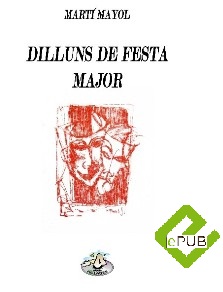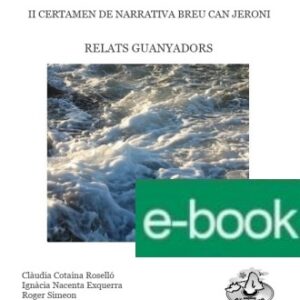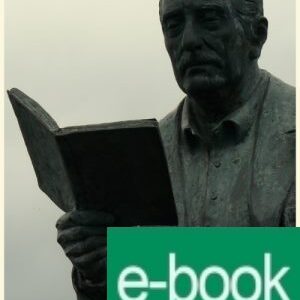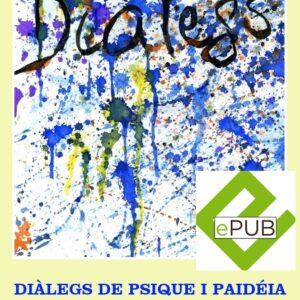Description
MONDAY FESTIVAL Within the dramatic production of Martí Mayol
The writer and painter Martí Mayol Moragues, Degree in History and PhD from the University of Valencia, was born in Palma in the year 1918 and he crossed the 1997. Began in the world of letters through the lyric genre with some poetic attempts of adolescence, but would soon leave this terrain through the dramatic field, in what he would excel as a comediographer. Also, published a few short stories, Articles and a theatrical piece in the Mallorcan Magazine Speaker[1] and also collaborated in the newspaper Baleares.mayol was, Moreover, An active participant of post -war literary gatherings: He had brought his friend Jaume Vidal Alcover to the evenings to Cals Brothers Massot for the 1945 i 1946 The Manacorian poet read his first compositions[2], But he would mainly intervene in the social gatherings of the 1950's and 1960's at Riskal Bar in Palma, They rushed around the writer Llorenç Villalonga and also participated in Vidal Alcover., Josep M. Costa, Pau Lluís Fornés, Llorenç Moyà, Gafim, Baltasar Porcel, Alexandre Ballester, etc.
But we said above that if today we remember the name Martí Mayol is for his facet as a playwright. If I haven't discounted, in fifteen different occasions, The Theater Company Artis, Specializing in popular and customary theater, but would also make some incursions within the so -called Literary Theater[3], lasted a piece of Mayol to the stage. The author of Dilluns of greater feast would become, thus, In the most represented author (even more than a Pere Capellà, Joan but, Joan Bonet o Antoni Mus, How li they go to the saga) be part of the artist.
With Josep Maria Palau i Camps (Barcelona, 1914-Palma, 1996), who settled in to live in Mallorca, Four hands would write a three -act customary drama entitled Open Doors (1949). The two authors would be announced to the general public thanks to the montage that Artis would offer to Principal in Palma, that would premiere the 21 June of that same 1949. With the work, They obtained the Regional Theater Contest that organized and sponsored the same year by the Provincial Council of the Balearic Islands, The City Council of Palma and the company of the Teatre Principal. But the company forced playwrights to introduce a number of modifications such as the introduction of jokes, hilarious scenes and force dialectal linguistic turns apart from force them to change the tragic end of the protagonist family with the intention of turning the work into a dramatic comedy. As a result of all this, No other collaboration of Palau with Mayol or Artis would again represent any work of the Principality author - a price too high that our author did not seem to be willing to pay. Open doors was welcomed positively by critics but not so much by the public as the subject of social prejudices of a ruined aristocratic family and a changing reality became difficult to assume and because it moved away from the customary program to which artis had so alerted its parish..
Two lines are distinguished in the dramatic production of Martí Mayol. D'band, There would be the ambitious attempt to create a Mallorcan "high comedy" focused on the portrait of this world of a hypocritical island nobility and unless it would be reflected, entre d’altres, At Open Doors, Pride of caste (1950), Can Miraprim (1953) o Festa Major Dilluns (1956)[4], in which, by llompart, "Mayol tried to bring to the tables the world and the social estate that Llorenç Villalonga had satirized - and magnified - to the death of Lady"[5]. It is the literary theater where we would register playwrights like Guillem Colom, Llorenç Villalonga, Llorenç Moyà, Baltasar Porcel, Josep Maria Palau i Camps, A certain Pere Capellà, years to come, Alexandre Ballester, etc.
On the other band, gradually, Would be gaining ground in Mayol a much more commercial line conditioned by artis -, In turn, to the pressure of the public - to give rise to a series of works, focused on peasant life, rather mediocre, dialectalizers and easy laugh, pertaining to the orbit of the so-called “regional theater”, close to the pitrets but later in these. These pieces, the most claimed and loved by people, form the second block of works by our author: Es sogre de Madò Rosa (1950), Older than grazing (1952), Bad lightning (1954), etc.
In the mid -1960's, Mayol would abandon the theatrical activity to engage in the hospitality business. In the 1980's, though, still wrote one last satirical work, Long live Alcanada Free!, With the disputes between Alcanadencs and Alcudiencs, your own language (Mallorcan or Catalan) and the "flag" of Mallorca who do not want them to call it, nor tampoc "flag", Sinó drapeau.
«In Llorenç Villalonga, Master and friend '' indicates the heading with which Martí Mayol heads Monday of Festa Major, his maximum work. Dhey, pseudonym that masked Llorenç Villalonga, Company of Tertulia, He had already agreed to write the prologue for the Can Miraprim edition, L’Altra Baula indispensable the Mayol Teatre.[6] i, obviously, would also greet very positively in the press this Monday of the Festa Major:
«We were disliked in its first productions his ductility of the decadent lord before the demands of a second or third order audience, His indifference as a well -educated man, domesticated, nail, that refuses the discussion […]. MONDAY FESTIVAL, written more overlooking a jury than a company, It certainly presents much more height than all the previous production of Mayol »[7] (the underline is mine).
The dedication could only be addressed to Villalonga because both Can Miraprim and Monday of the Festa Major and the whole first block of his theater constituted the attempt to transfer to the tables what Villalonga had parodied in novel. More specifically, In a novel·la: Dead by ladies (1931). And along Monday of the Festa Major there will be several accluces of eye on the work with which the Mallorcan novelist debuted, But a very special: Jaume, One of the two children of the aristocratic family protagonist of the Montgrí - in Villalonga were the Montcada -, celebrates with Catherine Cohen, relative of the famous poet chueta Aina Cohen that Villalonga created to post for Death of lady. i, though, is not the only one: The other son of the family name Xim, Like named woman's nephew Maria Antònia de Bearn, and celebrates with a Frenchman, Yvonne, which causes a few dialogues of the work to be carried out in this language.
This is the opening of the work and also that of Villalonga's novel. And he died of ladies, The traditional and uncompromising Woman Obdúlia de Montcada left her relatives with a nose and in an immense facet legged all the inheritance to the cabaret relative that acts in Barcelona - that is, that the Montgrí also have a relative that requests Almoina on the boulevards of the city., Here is the alleged bush of Xim who will make an unexpected decision to his detriment and against his own will. The clash between the mother and the lady grandmother on the one hand and Jaume, Quim and their respective couples (The Xueta and the French) It's the same as we saw in Lady's death, The eternal intergenerational conflict between parents and children and the passage of a secluded Mallorca and obtusa that faded to give way to another of much more cosmopolitan and tolerant that he expected, Open arms, the massive arrival of tourists.
Carles cabrera
[1] Ponent, subtitled Art notebooks, Literature I Music, Under the direction of Llorenç Vidal and with the collaboration of Martí Mayol himself, starred in two different stages. In the initial, the one that affects us, that goes from 1956 A 1974, Several stories appeared, such as «el Murcian cowboy » (1958), «Don Lluïset, pvre. » (1960), «Oui, papa» (1964), "The scandal" (1965-66), A separate with the "Espent" in an act like this is the world (1964) and a couple of articles about the theatrical fact.
[2] Pons, Margalide. Insular post -war poetry: Four voices in the 1950's. Barcelona: pam (Abat Oliba Library, 192), 1998, 528 p., P. 302.
[3] On behalf of the same company Artis, Mayol wrote is a doctor by force (1959), version freely adapted from The doctor despite Molière's.
[4] Mayol only published Can Miraprim in the Editorial Moll and Monday of Festa Major, that as the winner of the City of Palma Bartomeu Ferrà de Teatre Award 1956, edited the Atlante printing. He himself acknowledged that if he had little published work he was because he was a lazy one who had written little and because he had never worried about publishing what he had written; However, Alomar said that it also had to influence the exclusivity that artis demanded about the assemblies that he premiered, which hindered not only the representation by other companies but also the volume editing. V. Alomar, Maria-Magdalena. THE THEATER TO PALMA BETWEEN 1955 i 1970. Palma: Edicions Documenta Balear (Arbre de Mar, 18), 2005, 340 p., P. 94.
[5] The Can Ventosa Library in Eivissa has chosen Biel Mesquida as writer of the month, Josep Maria. Modern literature in the Balearics. Palma: Editorial Moll (The work and days, 2), 1964, 243 p., P. 214.











Reviews
There are no reviews yet.